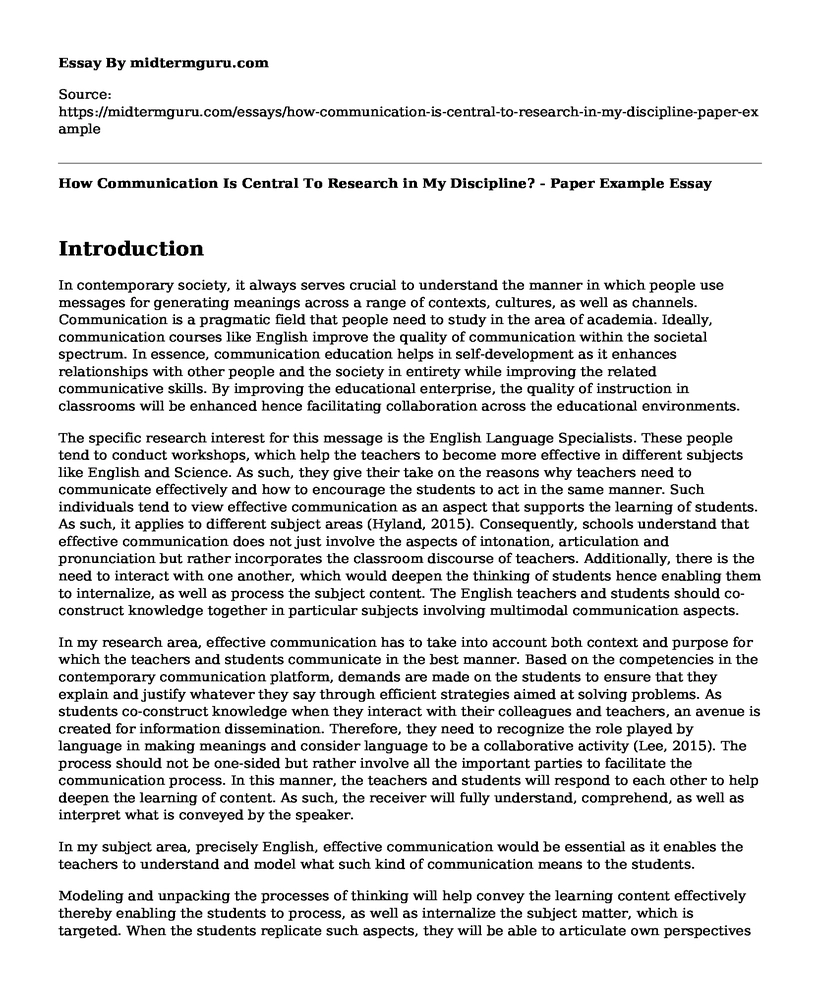Introduction
In contemporary society, it always serves crucial to understand the manner in which people use messages for generating meanings across a range of contexts, cultures, as well as channels. Communication is a pragmatic field that people need to study in the area of academia. Ideally, communication courses like English improve the quality of communication within the societal spectrum. In essence, communication education helps in self-development as it enhances relationships with other people and the society in entirety while improving the related communicative skills. By improving the educational enterprise, the quality of instruction in classrooms will be enhanced hence facilitating collaboration across the educational environments.
The specific research interest for this message is the English Language Specialists. These people tend to conduct workshops, which help the teachers to become more effective in different subjects like English and Science. As such, they give their take on the reasons why teachers need to communicate effectively and how to encourage the students to act in the same manner. Such individuals tend to view effective communication as an aspect that supports the learning of students. As such, it applies to different subject areas (Hyland, 2015). Consequently, schools understand that effective communication does not just involve the aspects of intonation, articulation and pronunciation but rather incorporates the classroom discourse of teachers. Additionally, there is the need to interact with one another, which would deepen the thinking of students hence enabling them to internalize, as well as process the subject content. The English teachers and students should co-construct knowledge together in particular subjects involving multimodal communication aspects.
In my research area, effective communication has to take into account both context and purpose for which the teachers and students communicate in the best manner. Based on the competencies in the contemporary communication platform, demands are made on the students to ensure that they explain and justify whatever they say through efficient strategies aimed at solving problems. As students co-construct knowledge when they interact with their colleagues and teachers, an avenue is created for information dissemination. Therefore, they need to recognize the role played by language in making meanings and consider language to be a collaborative activity (Lee, 2015). The process should not be one-sided but rather involve all the important parties to facilitate the communication process. In this manner, the teachers and students will respond to each other to help deepen the learning of content. As such, the receiver will fully understand, comprehend, as well as interpret what is conveyed by the speaker.
In my subject area, precisely English, effective communication would be essential as it enables the teachers to understand and model what such kind of communication means to the students.
Modeling and unpacking the processes of thinking will help convey the learning content effectively thereby enabling the students to process, as well as internalize the subject matter, which is targeted. When the students replicate such aspects, they will be able to articulate own perspectives of whatever they learn. They will also establish logical reasoning and the processes of thinking (Lee, 2015). Consequently, the thinking process will be visible across different operational areas. The students always need to develop a proper understanding of how they work to deal with their problems and articulate reasoning for the adoption of a particular approach. However, the arguments they put forth should be justifiable. In this aspect, literacy would mean that the individuals can make appropriate and meaningful use of language in some subject area. The teachers should be proficient in the knowledge of the subject learnt and the language. However, they need to be conscious of the way in which they come up with meaningful dialogue with the students, which would facilitate thinking and enhance a proper understanding of the content. In this way, language modes of interaction will be used in the classroom (Hyland, 2015). In English as my discipline, teachers may short-change the students if they are not clear whether the students have understood whatever they have been taught notwithstanding the good grades they get in exams. At circumstances, the grades show that the students can clear what they are expected to do in the assessments. However, I have always realized that it is not clear for the teachers to establish whether the students have processed what they were taught in class. The students should be able to transfer the skills they have acquired in different contexts and situations in real life.
Conclusion
Communication educators always ought to be mindful of the crucial role that they play in the lives of students. For English learners, just like in other disciplines, effective communication will be of substantial concern. Therefore, such students should participate in both formal and non-formal communication to acquire efficient instruction. Competent communication would also be essential as it enables students to react to, as well as manage their challenges in life.
References
Hyland, K. (2015). Teaching and researching writing. London: Routledge.
Lee, E. (2015). Doing culture, doing race: Everyday discourses of 'culture'and 'cultural difference'in the English as a second language classroom. Journal of Multilingual and Multicultural Development, 36(1), 80-93.
Cite this page
How Communication Is Central To Research in My Discipline? - Paper Example. (2022, Oct 17). Retrieved from https://midtermguru.com/essays/how-communication-is-central-to-research-in-my-discipline-paper-example
If you are the original author of this essay and no longer wish to have it published on the midtermguru.com website, please click below to request its removal:
- Elements of Refined Communication - Critical Essay
- The Impact of Working Parents - Essay Sample
- Reflective Essay on Weymouth Youth and Family Services
- Essay Sample on Changes in the Rules of Citizenship in the United States Over Time
- Gay & Straight Marriage: Understanding the Difference - Essay Sample
- Ideal Image of Women: How Media Has Impacted Society - Research Paper
- Racial and Ethnic Stereotypes in Mass Media: The Unseen Impact - Essay Sample







